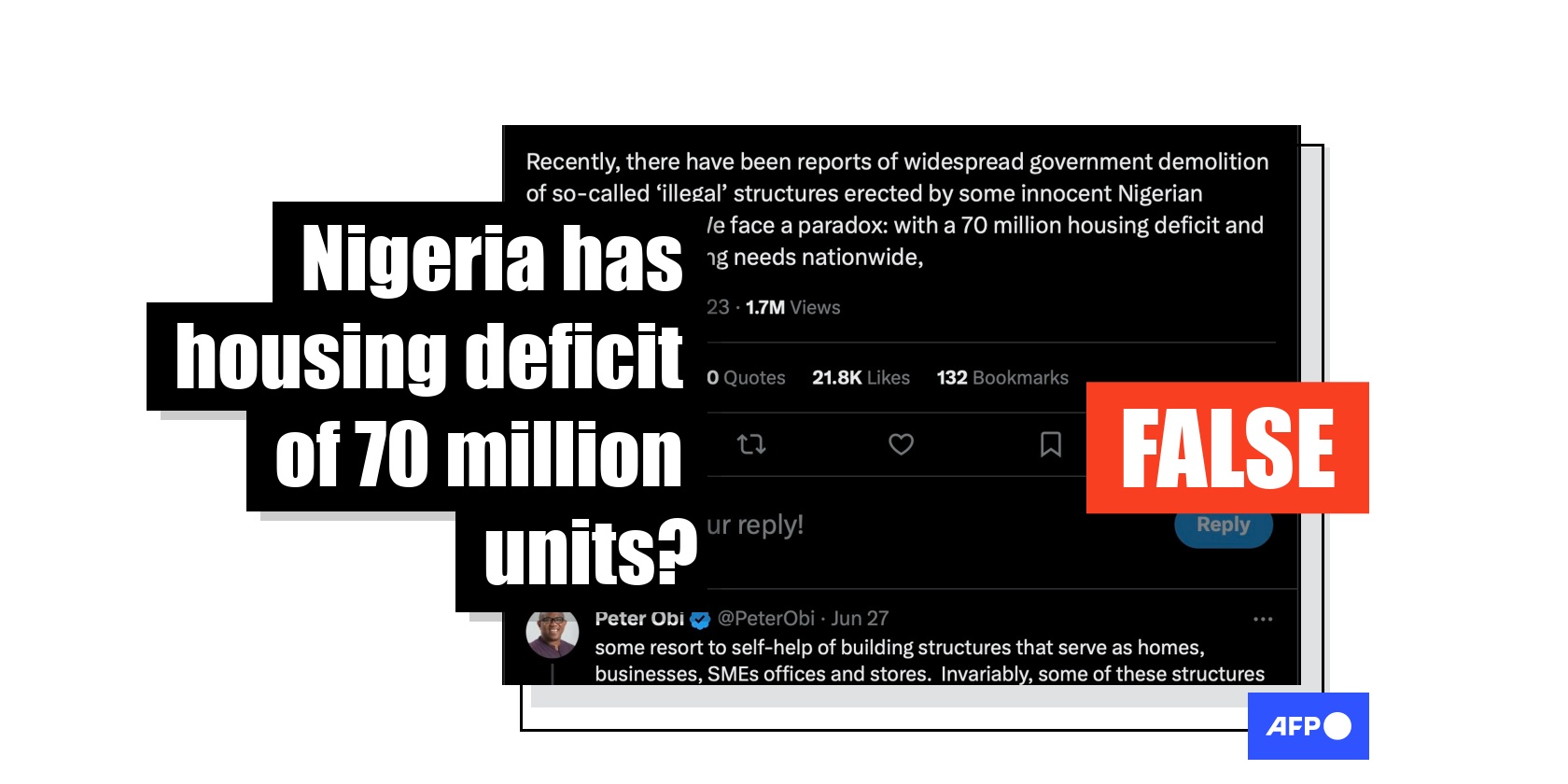
Nigerian opposition leader overstates country’s housing deficit
- This article is more than two years old.
- Published on July 7, 2023 at 12:17
- 2 min read
- By AFP Nigeria
"With a 70 million housing deficit and vast unmet housing needs nationwide, some resort to self-help of building structures that serve as homes, businesses, SMEs offices and stores," Labour Party's Obi said in a tweet on June 27, 2023.

Housing deficit is defined as a shortage in the number of homes needed to accommodate the population of a given area (archived here).
Obi published the tweet as part of a thread in reaction to the demolition of houses and businesses ordered by regional governments in Kano and Lagos states.
The opposition leader's post has been retweeted more than 7,800 times.
Lagos authorities in June announced the demolition of 17 houses because they were "distressed" and said the building owners had been first notified in 2016 (archived here).
Kano governor Abba Kabir Yusuf said several buildings in his state had to be destroyed because the lands on which they were built had been allocated illegally by the previous administration (archived here).
The demolitions in the two most populous states in the country attracted widespread criticism, with Obi saying the authorities should be more lenient.
"There should always be room for compassion and humane correction in taking any remedial action," he wrote in his Twitter thread (archived here).
But his housing deficit claim is false.
Various estimates
An online keyword search for "housing deficit in Nigeria" led to this 2022 Nigeria report (archived here) published by the Centre for Affordable Housing Finance Africa (CAHFA).
Nigeria has a shortage of 28 million housing units, according to the South Africa-based think tank.
This figure is slightly higher than the estimate from the Federal Mortgage Bank of Nigeria (FMBN). The bank said in a statement that the 2023 housing deficit is "estimated to be over 22 million housing units" (archived here).
The same statement, quoting FMBN CEO Hamman Madu, was published by news outlets here and here (archived here and here).
Deficit controversy
A 2016 report by United Nations Habitat said Nigeria had a total housing deficit of 17-23 million units.
But former housing minister Raji Fashola, whose term finished in late May 2023, rejected the CAHFA and UN-Habitat estimates, saying they were outdated and excessive.
"Nobody could provide an answer to how that figure was arrived at," Fashola told Nigerian broadcaster Arise News shortly before his tenure ended (archived here).
According to Fashola, the figures stemmed from the 2012 National Housing Policy, which was instituted around three years before he took office in 2015 (archived here).
"Successive efforts to meet this target have failed as the housing deficit now stands at over 17 million units in Nigeria," the document said.
Although Fashola acknowledged that Nigeria had a housing deficit, particularly in urban centres, he offered no current figure.
2030 projection
According to the World Bank, Nigeria will have the world's second-largest urban housing deficit with 10 million missing units by 2030 (archived here).
India, Pakistan, Indonesia, Nigeria, and Ethiopia are projected to have the largest rural population by 2030, with a cumulative "housing deficit of 112.9 million housing units".
Copyright © AFP 2017-2026. Any commercial use of this content requires a subscription. Click here to find out more.
Is there content that you would like AFP to fact-check? Get in touch.
Contact us
